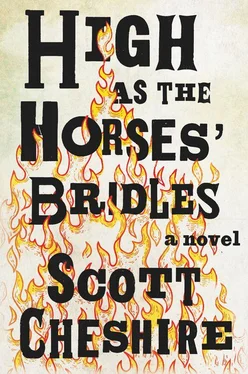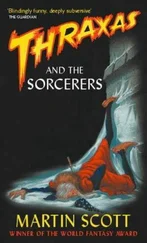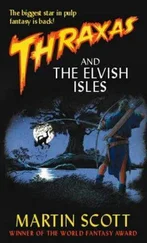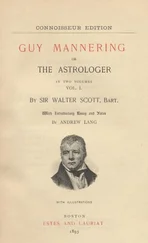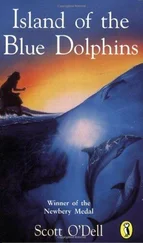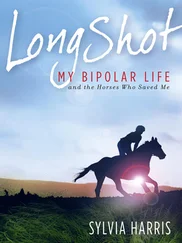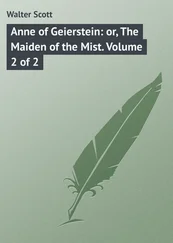“Josiah!” Dad shouted from upstairs. “Is that you?”
Mom looked up at me. She put both hands on my hand, and squeezed my hand. Her eyes were so very anxious. “You know that I want you to go, don’t you? You know I am not your father.”
“It’s gonna be fine,” I said. “I promise. And the moment you don’t feel good, you call me. I’ll jump right on a plane.”
Dad’s footsteps were on the stairs. “Josiah?”
Mom pulled at me weakly. I crouched down and we looked at each other face to face. My God, I came from inside this woman. Life was inside her, my life, and her life, and the very void I came from. Her cells would rise up and kill her, the second time around.
Dad’s footsteps were in the hall. “Josiah?”
I took her face in my hands, pulled her close, and kissed her head.
“Up,” she said. “Before your father—”
I shot up at the sound of his steps in the kitchen.
“So,” he said. “A big day for the big shot.”
A shadow, probably of some cloud, or of a passing plane, must have fallen over the house as the light gave way to dark through the blinds. The three of us stayed quiet, waiting for the daylight to right itself, because it always does. The next morning, I left for California, a brand-new millennium inching over the horizon.
It was high time for inventory: and what lovely things can I say of that storeroom? Not much. Then again, how was it that a room a third the size of all of Otter Computer contained so many things, more than the rest of the store combined? Boxes on shelves, on tables, on the floor — where was the floor? I could barely see it. I remembered painting the floor when we first moved in, a slate gray color, and we even tried to get fancy. We started painting decorative yellow caution lines around the shelves. They were tall shelves. But we abandoned the idea halfway. Who was ever back there, anyway, but us? Plus, business got busy so fast — back in the beginning, I mean — that we never got around to finishing. A good problem to have. But now we had plenty of time, a good thing, too, because it would take all day.
The storeroom was a mess. Rubber storage bins bursting with unwieldy spools of wiring, tools new and rusting, plastic tabs and drive plates removed from system cases, packages of nonscuff floor pads, of batteries and power cords. The cases themselves, desktops, large, small, and huge, arranged along the floor, against the wall, like VCRs tipped on their sides. And monitors! The dinosaur parts of the ’90s and early 2000s. Because they took up so much space. Like a television showroom in there, but stacked (of course, everything stacked), and precariously balanced on top of one another, 13-inch, 15-inch, 20-inch screens. Some were missing glass altogether, looking like cubbyholes for shoes. Screens were cracked, even shattered, broken shards protruding from the sides like teeth. My God, there was so much media, too. Zip discs, floppies, and compact discs. Bags of magnetic tapes. And the drives for each and every one, floppy drives and hard drives, the all of a sudden everywhere CD-ROM. And of course the boxes, so many boxes — of brand-new products, or broken products, or wrong products waiting for RMA return authorization stickers from distributors so we could hopefully, let us pray, get our money back. Laptops piled like impenetrable textbooks. Keyboards piled high like delicate rectangular plates. Green translucent motherboards like slices of vegetative earth, freeze-dried for science and posterity. And not just the current, but the past, the long and recently dead stuff mercilessly mined for parts, from manufacturers who had long ago disavowed their products. It was overwhelming, gloomy, and cold.
Amad on the other hand was out front, with people — customers, maybe. Warm sun coming through the windows.
I stepped on a screw; it went right through my sole and into my foot. I cried out.
“Josie?”
“I’m fine!” I heard Amad coming closer, talking to someone, maybe Teri.
“I’m fine,” I said. “Stepped on something, but I’m good. Just leave me alone and we’re in business.”
“Good!”
He walked away.
I saw in a far corner, by the back wall, a small clear space. By the memory and CPUs. The central processing units, each no bigger than a stamp. I went over there, with clipboard in hand, and made sure my pen could write. I decided to start with the memory and the CPUs, which hold a special place for computer technicians, for someone like Amad, because without them you have no computer. Not so unlike a human, a computer can always do more, and know more, but only with respect to the capacity of memory and the CPU. The two hemispheres of a computer’s brain. As for computer sellers, like me, the processors were special because they were expensive.
They were the only carefully ordered things in that room. Memory chips set in foam, in shut black cases. In neat rows like caviar tins. I read each label and made careful notes of what memory we actually had, what we thought we had, and before long my mind strayed away to other precious things.
I used to at one time actually believe Sarah had always been waiting for me in California. But tragedy generally works on us this way. We retrofit, like a prophecy in reverse. Sarah and I met in the Otter Beach Bookstore (also now out of business). I was standing there holding a large used King James Bible bound in soft leather, very old, and it fell open in my hands like a small animal dozing in my arms. Oversize and heavy, with a crimson silken bookmark hanging from the pages like the tongue of some serpent encased in a large block of yellowing cheese. I used to sometimes go to the bookstore in the middle of the day just to hold the massive thing in my hands. Never really read from it, except for the times I scanned for typos. I’d never once seen a typo in any Bible whatsoever and this had worried me for years. I wanted to look at it and hold it, open it and smell it, try to imbibe it in a way I’d not done before. To the point that I once tore a small corner piece from a page and let it soak on my tongue like a wafer. That was only the once, and I felt stupid afterward. It tasted the way old pillows smell. I was thirty-two when this happened.
Nathan Two Foot was the grumpy and vaguely Native American man who owned the bookstore. He would say something like, “Just take it already. From me to you.”
And I would say, “But then I’d have no reason to come here and bother you.”
And then I would usually leave, because my store needed me. Actually, at that point, my four stores needed me.
When I met Sarah, I guess I was something of a retail mogul, a respected businessman of the community. Amad and I led in points on the company’s league bowling team. Here I was, a man with a 180 average and a custom red leather bowling glove. Team captain — a reluctant one, though. I liked being in charge, and part of me liked the attention. It came naturally to me, but it also made me feel uncomfortable. What I liked most was maintaining a cool and quiet presence at work, making random check-and-sees at the other locations. Employees looking up from a computer screen surprised to find me standing there and smiling. I never said much. But when we bowled or had a barbecue at Amad’s or an employees’ night at a local Chili’s, I liked the opportunity to command. I would stand, and surprise them again. I would be charming, magnetic, if I wanted. But on most days, I didn’t feel the need. I watched Sarah walk into the bookstore, not so much walk in as fall in, with her thin black running shorts, and her nearly sheer and wet-with-fresh-sweat T-shirt, aqua blue running bra showing beneath. The lenses of her glasses fogged. She came falling in with her hands on her knees, completely out of breath.
Читать дальше
